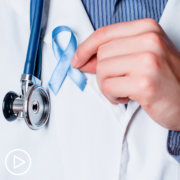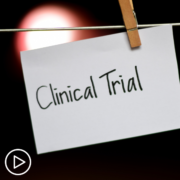What Questions Should Prostate Cancer Patients Ask About Clinical Trials?
What Questions Should Prostate Cancer Patients Ask About Clinical Trials? from Patient Empowerment Network on Vimeo.
What should prostate cancer patients know about clinical trials? Expert Dr. Tanya Dorff discusses important factors that should be considered when deciding to join a trial shares key questions to ask your healthcare team about participation.
Related Resources:

|

|

|
Transcript:
Katherine:
Yeah. What sorts of questions should patients ask their doctors about clinical trials?
Dr. Dorff:
There are a few really basic things to ask about any clinical trial that you’re being presented as an option. One is is there a randomization? Is there a treatment assignment where some people get one treatment and some people get another treatment? Another one is is there a placebo? I think if we just get those questions up front, right away, then people may be more open to hearing what’s happening in the rest of the trial.
Our informed consent documents are reviewed by ethical consultants and are really meant to inform about risks more than benefits, so the other thing to really ask the provider is what’s the goal of the trial, because that’s often not clearly communicated in an informed consent. Why did the people who designed this trial think it was a good idea? Is there science behind it, is there clinical data behind it, and do you think this is something that, in the future, could end up being the new way that prostate cancer is treated?
What is it about me that you think makes me a good candidate for this trial? What’s been your experience? – even though it’s more anecdotal, but it’s often nice to hear from a physician “I have patients on this trial, they’re having these types of side effects, they’re having these types of benefits, and we can’t know what will happen for you, but at least I have a sense of how things are going on this trial.”
Katherine:
Yeah, those are great questions. What about cost? Is that a question that patients should ask about?
Dr. Dorff:
Patients often do ask about that. Costs are really complex in this medical care landscape that we have in the United States. Clinical trials – I think there’s a lot of misunderstanding about costs. Some people think that everything is paid for by the clinical trial, which is not true.
There is a system by which we assign things that will be paid for by the clinical trial – anything that’s novel and only being done as part of the trial versus things that would be done anyway if you were not in the trial and if you were just receiving regular care, such as your PSA test, your clinic visit, your CAT scan potential, or your bone scan.
So, there are some costs that are not covered, and in that case, if a patient has an insurance plan where they have copays for a clinic visit or for a CAT scan, those aspects that are not felt to be unique to the clinical trial and are getting billed to standard insurance – that means they’re still going to have those copays, but anything that is unique, if there’s an extra set of scans, if there are extra clinic visits, those get billed to the study, and the patient should have no extra cost on that basis.
Insurance companies should view clinical trials very favorably, because they’re often getting some clinical care paid for. They’re getting extra treatment at no cost, so anything that’s new on the treatment plan in the clinical trial is free to the insurance company on the patient, it’s paid for by the study, so it’s a good deal, generally speaking, and more importantly, there’s legislation that really seeks to ensure that regardless of your insurance, you should have access to clinical trials because they are felt to be often the best way to have your cancer treated.








